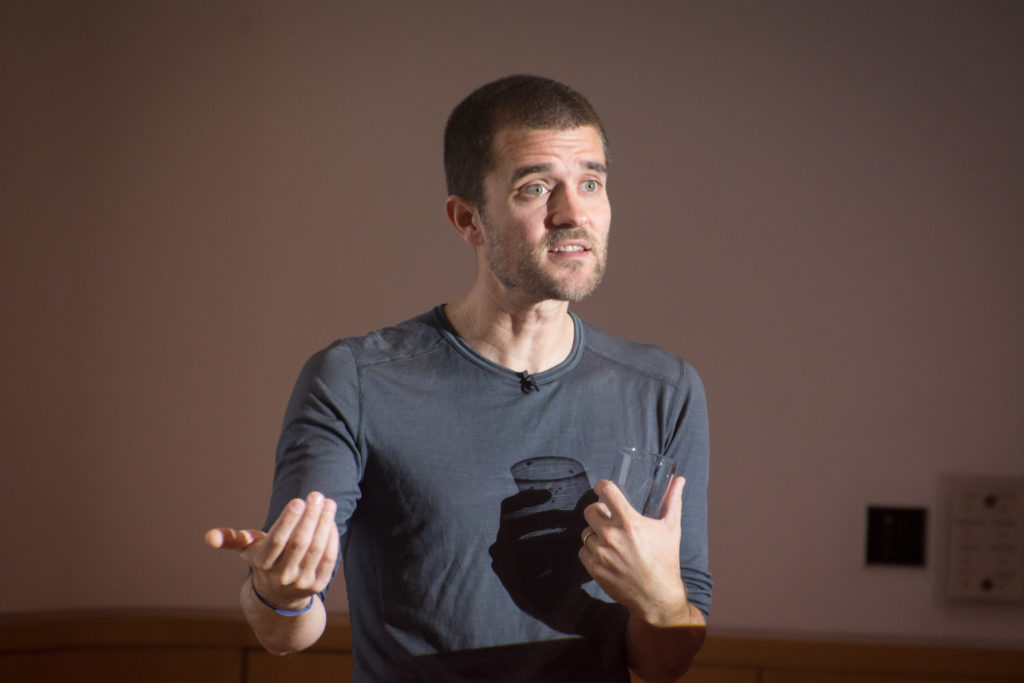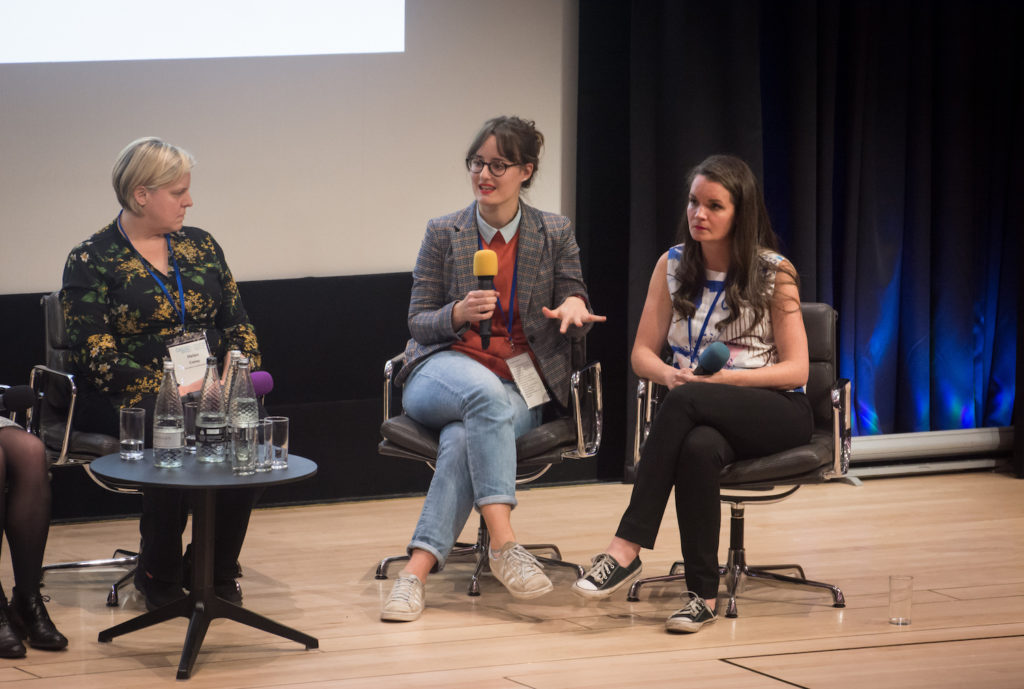If you missed the conference or simply want a refresher, many of the slides are available on the Museums+Tech 2019 page.
I had the great good fortune to be in London a couple of weeks ago on other business when Mia Ridge reminded me that Museums Computer Group was having its annual conference that same week. I’d watched it via Twitter for years, but never had the chance to attend until now. And I am very glad I did. The theme of ‘Openness’ was incredibly timely, and the talks all explored some of the interesting frontiers of museums’ ongoing quest to figure out what it means to be more open and accessible to more audiences, both digital and physical. And it’s hard going. There were a lot of great presentations, but I want to focus mainly on the beginning and end of the day. The opening and closing presentations really challenged the audience to think more deeply about what it means to be more ‘open’ and to do so thoughtfully.
Is the Met open? And is that the right question to ask?
Loic Tallon, former Chief Digital Officer of the Metropolitan Museum of Art in New York City, and no stranger to MCG, started off the conference with a powerful exploration of the idea of ‘openness’ as it applied to his work at the Met, along with plenty of hard-won wisdom about making the case for ‘open’ digital initiatives as a strategic asset for museums, indeed a ‘superpower’ that we don’t yet adequately leverage.

Loic found it more constructive for the Met to explore the benefits and value of going open rather than worrying about loss of revenue. Openness is worth the investment and indeed is necessary to succeed in digital, which he demonstrated using examples of when the museum’s open access collections images began being used in Wikipedia articles.
He also introduced a theme that came to dominate the day: the evolution of museums’ digitisation efforts moving past the old ‘should we or shouldn’t we?’ open vs closed debate, to more granular efforts to understand what ‘open’ actually means. Considering how much openness is appropriate is a very different lens through which to view our digitisation efforts. Loic asked the question ‘Is fair better than open?’, offering up the “FAIR Guiding Principles for scientific data management and stewardship” that emphasise making digital assets findable, accessible, interoperable, and reusable.
There was a lot more to his talk that searching the #musetech19 Twitter thread will reveal, but I’ll list three of my favourite moments and then move on:
- Loic described several tactics that he had employed to build institutional support around digital initiatives, including the provocation that openness is a tactic in the same way that a building is a tactic for achieving your mission statement. If you were to start from scratch with a modern museum’s mission statement, would you build a building?
- Book recommendations! While at the Met, Loic published a monthly reading list as a soft power tool, and came with two books that had affected him greatly. I love hearing not only the insights of speakers, but also hearing from which wells they drew their inspiration. So, consider checking out Grit by Angela Duckworth, and Jennie Lee: A Life by Patricia Hollis
- When asked a question about decolonisation at the end, Loic responded that he didn’t have a very sophisticated opinion on the topic, but if the speaker really wanted, he’d try to answer. In a month where we have many senior leaders more than happy to share unsophisticated opinions in Guardian opinion pieces, I found that display of honest humility very powerful. More of that kind of modelling, please!
Thinking differently about digital
Luigina Ciolfi from Sheffield Hallam University talked about using the metaphor of thinking of digital projects as ‘recipes’, which I found very intriguing. Cooking: the idea of using a set of rules within which one improvises (‘season to taste’) is a much friendlier and accessible framework for thinking about our work than the hard science associations that come along with the ‘lab’ or ‘incubator’ metaphors. It also privileges the idea that someone else will make the actual food. Our job is not to bake the dish, but to make sure the ingredients and recipe are useable. A Digital Test Kitchen? Scrumptious!
When Open Data aren’t enough
The ‘Open data, Wikimedia, and Reuse’ session offered up three very interesting projects that explored how museums can connect to the larger world of open data out there to create richer explorations of topics. And, unwittingly exposed a constant problem with uncritical linkages to open data sources like Wikidata or Wikipedia: the biases programmed into these sources will manifest in our projects that draw from these sources. After Jason Evans, Martin Poulter and James Morley demonstrated their projects, an audience member pointed out that women were almost completely unrepresented in all three projects, and asked how can we counteract that bias? This led to a lively conversation about what could and couldn’t be done, which carried on well into the evening on Twitter. It was a great example of how hard questions can be asked and held up for discussion without turning into fault finding and acrimony.
Digitisation is not neutral
A constant thread throughout the day was the impact of the French government’s Sarr-Savoy Report ‘The Restitution of African Cultural Heritage. Toward a New Relational Ethics’ and responses to its sweeping recommendations about digitising African collections objects in French collections. Earlier in the day, James Baker asked the question, ‘What role can openness play in decolonising collections and in engaging with sometimes difficult and dubious organisational histories?’ in his talk on African collections. He then went on to quote Andrea Wallace’s and Mathilde Pavis’ response to Sarr-Savoy Report,
‘The current practice of Western governments and heritage institutions campaigning for and leading digitisation projects according to Western values and priorities, such as open access, may be appropriate for their own cultural heritage. As applied to non-Western cultural heritage, it carries the potential to sustain the very colonial approaches the Report takes great care to denounce.’

At the end of the day, Wallace and Pavis offered their own thoughts on ‘Finding the Nuance in Open Access During the Repatriation of Cultural Heritage’ where they counselled us to consider the ramifications of unconsciously perpetuating colonial systems of oppression and erasure in the rush to get all our collections online. They argued persuasively that digitisation is not neutral, and it is not a non-act, so due diligence is required in any effort: ‘Digital cannot be thought of as an afterthought in repatriation.’
Their presentation and the discussion were a great example of how to think about how digital colonialism can play out, unless care is taken. As one who has always equated digital practice with progressive democratic values, the idea that all our systems of knowledge can be thus influenced was a real wake up call that we will need to be constantly aware of in our projects. I hadn’t considered the connections between decolonisation and copyright law. On the one hand, objects that ‘can’t be returned’ could perhaps be digitally repatriated. But for objects whose very presence in a museum could be legally debated, like the Benin bronzes, that uncertainty would apply to rights of reproduction, like including images in an open database.
And with that, the formal events were over, and we carried on for another few hours at the pub. It was an action-packed event, and I was happy to be able to finally participate! I look forward to seeing the programme for #mustetech20!

